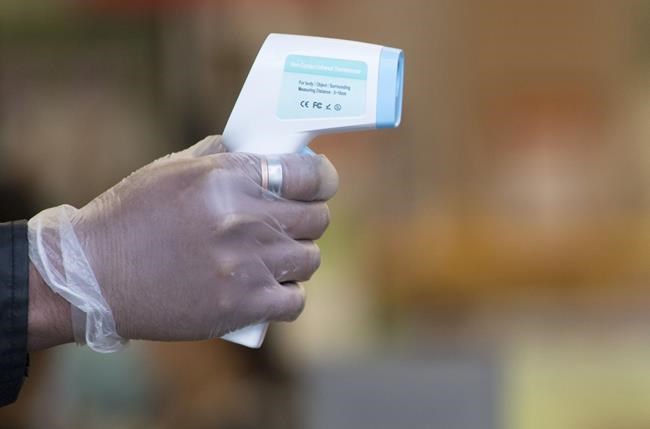Companies gear up for return to work with new policies to stop COVID-19 spread
Advertisement
Read this article for free:
or
Already have an account? Log in here »
To continue reading, please subscribe:
Monthly Digital Subscription
$0 for the first 4 weeks*
- Enjoy unlimited reading on winnipegfreepress.com
- Read the E-Edition, our digital replica newspaper
- Access News Break, our award-winning app
- Play interactive puzzles
*No charge for 4 weeks then price increases to the regular rate of $19.00 plus GST every four weeks. Offer available to new and qualified returning subscribers only. Cancel any time.
Monthly Digital Subscription
$4.75/week*
- Enjoy unlimited reading on winnipegfreepress.com
- Read the E-Edition, our digital replica newspaper
- Access News Break, our award-winning app
- Play interactive puzzles
*Billed as $19 plus GST every four weeks. Cancel any time.
To continue reading, please subscribe:
Add Free Press access to your Brandon Sun subscription for only an additional
$1 for the first 4 weeks*
*Your next subscription payment will increase by $1.00 and you will be charged $16.99 plus GST for four weeks. After four weeks, your payment will increase to $23.99 plus GST every four weeks.
Read unlimited articles for free today:
or
Already have an account? Log in here »
Hey there, time traveller!
This article was published 01/05/2020 (2055 days ago), so information in it may no longer be current.
TORONTO – When employees at boot manufacturer Royer headed back to work last week, their days started with a temperature check as they filed in to the Quebec-based company’s facilities while remaining at least six feet apart.
They were asked whether they had a runny nose, cough, cold or trouble breathing. Reminders to wash their hands regularly were handed out along with face masks and visors before anyone made it to a work station. At lunch time, workers noticed microwaves had been removed to keep them from spreading germs.
“The first day was complicated, with patience needed for everybody,” said Claude O’Reilly, Royer’s executive manager of Canadian operations. “Then after that — it’s been two weeks now — there’s no complaints, no questions, no nothing.”

Royer was among the first wave of businesses that reopened in the midst of COVID-19, helping create a blueprint for the scores of companies that will soon follow suit in Quebec, Saskatchewan and Prince Edward Island.
Those provinces are the first to attempt a gradual return to work — a time-consuming and sometimes costly process that will come with plenty of changes to facilities, policies and interactions on the job.
Before they returned to work, O’Reilly said Royer pored over government and public health guidance and liaised with its union to come up with precautionary measures. Gallons of hand sanitizer and alcohol disinfectant were purchased.
Those who sew some of the boot parts already have distance between their machines and don’t face each other, which made the return to work easy for them, said O’Reilly.
In Regina, chief executive Greg Dukart is preparing to restart golfing at the Wascana Country Club, where Brooke Henderson won the CP Women’s Open in 2018.
“There is great excitement, because at one time there was a thought that there would be no golf or golf in the fall and that really petrified a lot of people,” he said.
On May 15, when the private club opens, golfers will be met by an attendant outdoors, who will answer questions and explain the changes.
The clubhouse will remain closed and there will be no ball washers or course furniture. Members will have access to items stored in their lockers and their clubs through a delivery service and the club will continue using its online lottery system to set up tee times and minimize contact.
Dukart said members who have heard about the changes have been understanding.
“It is what it is. It could be a heck of a lot worse with no golf,” he said.
Ontario has yet to begin the reopening of its economy, but this week unveiled industry-specific guidelines for when companies get the go-ahead.
Businesses, it said, should discourage sharing of telephones, keyboards, desks or workstations, reposition furniture to increase physical distances or install barriers and partitions, and stagger start times and breaks.
In the construction, agriculture and trucking industries, businesses are being told to plan for enough tools to be on site so workers don’t have to share, limit the number of people who use elevators and hoists at one time and disinfect trucks and equipment upon returning them.
Auto companies are being advised to limit services and open on an appointment-only basis. If companies have service bays with little distance in between, the government recommends using every other one.
Even once up and running, it won’t necessarily be smooth sailing.
At Royer, O’Reilly said workers are concerned about warmer weather, worrying that wearing a mask is going to be hot.
“We’ll see how things pan out,” he said. “Maybe we will decide to work on the half days because it won’t be too hot for them.”
This report by The Canadian Press was first published May 1, 2020.


